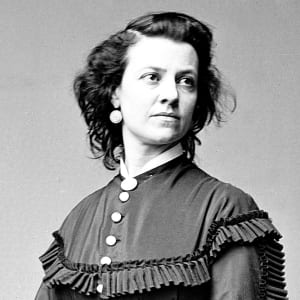
Pauline Cushman
Pauline Cushman was an American actress and spy during the Civil War. She was caught and nearly executed, but was freed. She later toured the country recounting her exploits in lectures and one-woman plays.
Synopsis
Pauline Cushman was born on June 10, 1833, in New Orleans. Seeking an exciting life, she traveled to New York City to become an actress. During the Civil War she was offered the opportunity to work as a spy for the Union Army. She accepted and soon gained the confidence of high-level Confederate officers. Caught and nearly executed, she was eventually freed and later toured the country retelling her exploits. Fame soon faded, however, and she died in San Francisco of a drug overdose on December 2, 1893.
Early Life
Pauline Cushman was born Harriet Wood, on June 10, 1833, in New Orleans, Louisiana. When Harriet was a young girl her family moved to Grand Rapids, Michigan. The wilderness was not to her liking, however, and at age 18, she briefly returned to New Orleans and then moved to New York City to pursue an acting career. Her beauty and poise quickly earned her roles in several plays, and she adopted the stage name Pauline Cushman in honor of her idol, actress Charlotte Cushman.
On February 7, 1853, Pauline married musician Charles Dickinson and moved to Cleveland, Ohio. They had two children, son Charles Jr. and daughter Ida. In 1862, Charles enlisted as a musician in the 41st Ohio Infantry. However, he soon contracted dysentery and was sent home. He never fully recovered from his illness and died in December 1862.
Actress and Infiltrator
Following the death of her husband, Pauline Cushman left her children in the care of family and returned to acting. While touring in Union-controlled Kentucky in March 1863, she was approached by a pair of Confederate sympathizers and offered money to toast Confederate president Jefferson Davis. Hesitant at first, for she supported the Union cause, she reported the incident to the Union provost marshal in Louisville. Seeing the possibility of her gaining Confederate trust, he told her to accept the offer. During a performance, she hoisted a glass and said, “Here’s to Jefferson Davis and the Southern Confederacy. May the South always maintain her honor and her rights!”
The Northern managers of the theater group were appalled and fired her on the spot, but as expected, Pauline Cushman became a darling of the South. Chief of Army Police, Union Colonel William Truesdail, instructed her to travel behind Confederate lines and learn all she could. He warned her that it would be dangerous and that if she was caught, she’d be tried—and hanged—as a spy.
Caught and Condemned to Death
Sometimes posing as a woman and other times as a young gentleman, Pauline Cushman was able to gain the confidence of high-level Confederate officers and eavesdrop on their conversations. In June 1863, while visiting the camp of Confederate general Braxton Bragg, she discovered his battle plans and tucked them in her shoe. Unfortunately, she aroused suspicion and was arrested. Using her acting skills and feminine charms, she almost escaped, but the battle plans were discovered. General Bragg initially hesitated trying a woman, but the evidence was too damning—Cushman was tried, convicted and sentenced to hang.
Awaiting her fate, Pauline Cushman became sick—or possibly faked illness—and her execution was delayed. Eventually, Union troops converged on the area and the Confederate army left her to be rescued. With her cover blown, her spying days were over, but she received commendations from General James A. Garfield (future president of the United States) and President Abraham Lincoln and was awarded the rank of Brevet-Major.
Post-War Celebrity
Pauline Cushman used her new-found celebrity to her advantage, touring as “Miss Major Cushman,” even before the war ended. In one-woman plays, she told harrowing—and somewhat exaggerated—tales of her exploits. She was featured in P.T. Barnum’s American Museum in New York and performed in Boston and San Francisco. In 1865, her friend Ferdinand Sarmiento wrote her biography, The Life of Pauline Cushman: The Celebrated Union Spy and Scout.
Later Years
As interest in the war faded, so too did Cushman’s notoriety. She married August Fichtner in 1872, but he died within a year. She then married Jere Fryer and operated a hotel in Casa Grande, Arizona. Their marriage didn’t withstand the death of their adopted child, however, and Pauline was soon on her own. Suffering from arthritis and rheumatism, she self-medicated with opium and eventually became addicted. Though she received a meager pension from her first husband’s military service, it didn’t last long.
Nearly destitute, Pauline Cushman moved to San Francisco, a town she had always loved, and worked as a seamstress and charwoman. Suffering from pain and poor health, she died of an opium overdose on December 2, 1893, at the age of 60. She is buried in the officers' section of Golden Gate Cemetery at the Presidio. Her simple gravestone reads, “Pauline C. Fryer, Union Spy.”




